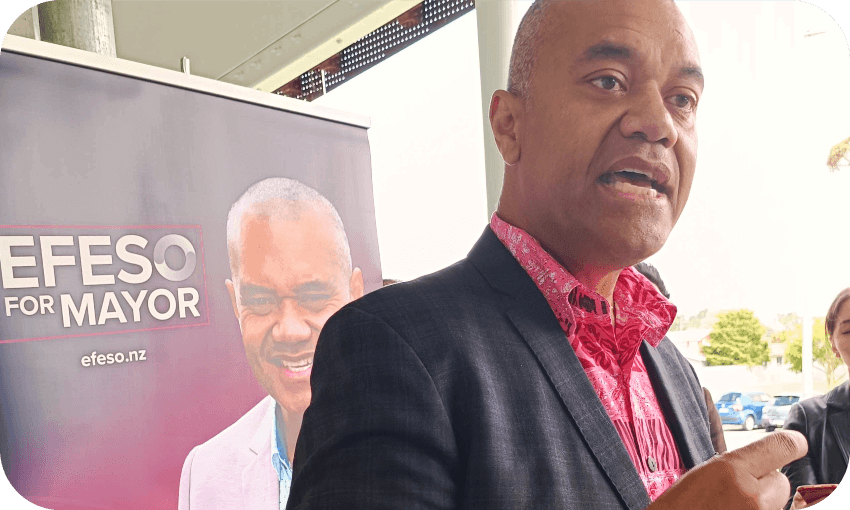Three weeks after the Auckland election, Collins has spoken of the ‘biggest challenge’ identified by researchers commissioned by his campaign.
In his first public appearance since losing the Auckland mayoral election to Wayne Brown, Efeso Collins has spoken about the campaign and the uphill battle created by a swathe of racism in the electorate – as identified in research that he commissioned.
Collins was appearing as one of a group of speakers in a session yesterday on diversity in democracy at He Whenua Taurikura Hui, the annual conference on countering terrorism and violent extremism. He was relieved to make an appearance after “three weeks locked in my house” since the campaign ended, he joked.
At the outset of his campaign, an independent consultant’s assessment of the electoral landscape and perceptions of the two-term south Auckland councillor’s candidacy returned some bleak findings, he said. “The biggest challenge for Efeso [stated] in the report was: the colour of his skin.”
“We are a diverse, egalitarian society, I’d been taught at university,” said Collins, “Except when you get research groups that tell you what the challenge is. Somebody even put a number on it. They said, ‘Efeso, this will cost you between 20,000 and 30,000 votes’. You think about that for a minute. Brown boy, Ōtara born and raised, standing for the highest office in the city – and I can talk about it now – I had to find 30-odd thousand voters who are at least going to be kind to me given that I’m brown. That’s what diversity and democracy looks like in our city, perhaps in our nation today.”
His own experience was reflected in the “genuine frustration and perhaps anger expressed at this conference” from many in the Muslim community about where the burden of change lay, said Collins. “I think over many years we’ve set up a system that deliberately marginalises certain communities … When I talk about race, [it is expected that] I talk about it in a way that is palatable to the perceived voter. Which means I’m constantly having to reframe things. No wonder comms people make so much money. They kept saying to me, ‘get a PR firm.’ I said, ‘I don’t need your PR firm, I’m going to be me. And it cost me the election,” he said with a sardonic laugh.
Collins recounted the experience of last year, after the then councillor tweeted his concerns that TVNZ’s Police Ten 7 was reinforcing racist stereotypes. “The police called me and said, we’re sending over the bomb squad. Your family has been receiving death threats … We had the bomb squad come through my home, through my office in Manukau, through my office in town and through the town hall. Think about that for a minute. My job is to stand for a community, to advocate on their behalf, and I thought I was doing that. I sent the tweet out. And before I knew it I had the bomb squad from the airport going through my home. Imagine what that’s like for my two young daughters. Imagine what that’s like for my wife, who’s then asking me: ‘and now you’re going to run for mayor, are you crazy?’ That’s the cost of democracy for people who have been othered for so long,” said Collins.
“That’s the reason we’ve got to have this conversation honestly – because that’s the reality we face: the 30,000 votes we’ve got to find from people who aren’t going to look first at the colour of your skin.”
Strategies to address a lack of diversity in democracy and the deluge of attacks from keyboard warriors, “or what I call keyboard ram-raiders”, needed to “constantly think”, said Collins, deploying a sporting analogy, “about what’s happening off the ball”. That included civics education, looking at the makeup of leadership teams and the shape of workspaces, “engaging with people who are different from ourselves” and “whether there is true diversity and inclusion in the way we think, the way in which we make decisions”.
The biggest challenge, he said, was “how we give up space so someone else can sit at the table.” In remarks that were invoked and endorsed by Andrew Little, the minister responsible for security agencies, in his closing address to the hui later in the day, Collins said: “Some of us are going to need to back away from the table and say, you come and take my seat, and I will support you.”
Collins is confident, however, that his own run for the mayor will have made some positive impact. Speaking to media at his election day event in Ōtara, he said: “I hope that young people and young brown kids in particular look at my candidacy and go, ‘Wow, it’s normal now.’”
He told The Spinoff last night that his message to a young brown person considering going into politics “would be my campaign is proof that being in the arena is evidence that we can do anything. We must believe in ourselves and harken the call of our ancestors to ourselves new horizons. I’m immensely proud of the campaign we ran and am filled with hope.”
Asked about his own career after local government, Collins said in a message: “I am in conversations regarding future opportunities and am enjoying the time to reflect, chill with my family and set new goals for myself. I’m humbled by the job offers I’ve received and want to continue do work that lifts opportunities for our communities.”





